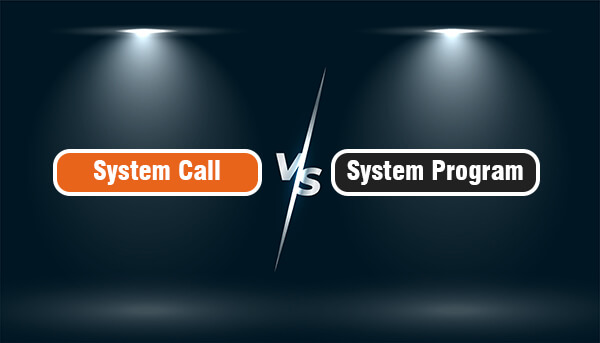Difference between System call and System Program in Operating SystemSystem calls and system programs are critical to the operation of the OS. These structures describe the functions that the operating system must carry out. The system call establishes a connection between the user software and the operating system's services. In contrast, the system software defines the OS user interface. The system program also offers a proper environment for the development and execution of a program. For example, a modern operating system includes system programs such as an assembler, compiler, editor, loader, etc. These programs enable programmers to create and run new programs. In this article, you will learn about the difference between the System Call and System Program in the operating system. But before discussing the differences, you must know about the System Call and System Program in the operating system. What is a System Call?It is a method of interaction with the OS through the system programs. It is a technique in which a computer system program requests a service from the OS kernel. The Application Program Interface (API) helps to connect the OS functions with user programs. It serves as a bridge between a process and the OS, enabling user-level programs to request OS services. System calls may only be accessed using the kernel system, and any software that consumes resources must use system calls. Types of System callThere are mainly five kinds of system calls. These are classified as follows:
Now, you will learn all these different types of system calls one by one. Process Control It is responsible for file manipulation jobs, including creating files, deleting files, reading, opening, writing, closing, etc. File Management It is responsible for file manipulation jobs, including creating files, opening files, deleting files, closing files, etc. Device Management These are responsible for device manipulation, including reading from device buffers, writing into device buffers, etc. Information Maintenance These are used to manage the data and its share between the OS and the user program. Some common instances of information maintenance are getting time or date, getting system data, setting time or date, setting system data, etc. Communication These are used for interprocess communication (IPC). Some examples of IPC are creating, sending, receiving messages, deleting communication connections, etc. What is System Program?System programming may be defined as the act of creating System Software by using the System Programming Languages. A system program offers an environment in which programs may be developed and run. In simple terms, the system programs serve as a link between the user interface (UI) and system calls. Some system programs are only user interfaces, and others are complex. For instance, a compiler is complicated system software. The system program is a component of the OS, and it typically lies between the user interface (UI) and system calls. The system user view is defined by the system programs, not the system call, because the user view interacts with system programs and is closer to the user interface. Types of the System ProgramThere are mainly six types of system programs. These are classified as follows:
Now, you will learn all these different types of system programs one by one. File Management It is a collection of specific information saved in a computer system's memory. File management is described as manipulating files in a computer system, including the creation, modification, and deletion of files. Status Information Status information is information about the input, output process, storage, and CPU utilization time, how the process will be computed in how much memory is necessary to execute a task. File Modification These system programs are utilized to change files on hard drives or other storage media. Besides modification, these programs are also utilized to search for content within a file or to change content within a file. Programming-Language Support The OS includes certain standard system programs that allow programming languages such as C, Visual Basic, C++, Java, and Pearl. There are various system programs, including compilers, debuggers, assemblers, interpreters, etc. Program Loading and Execution After Assembling and Compiling, the program must be loaded into the memory for execution. A loader is a component of an operating system responsible for loading programs and libraries, and it is one of the most important steps to starting a program. The system includes linkage editors, relocatable loaders, Overlay loaders, and loaders. Communication System program offers virtual links between processes, people, and computer systems. Users may browse websites, log in remotely, communicate messages to other users via their screens, send emails, and transfer files from one user to another. Key differences between System Call and System Program in Operating System
There are various key differences between the System Call and System Program in the operating system. Some main differences between the System Call and System Program are as follows:
Head-to-head comparison between the System Call and System Program in Operating SystemThe OS has various head-to-head comparisons between System Call and System Program. Some comparisons of the System Call and System Program are as follows:
ConclusionEach OS has a unique system call set that specifies what it can and cannot perform. These system calls invoke system services that the user program has requested. In contrast, the system program satisfies the usual requests that are requested by the user programs. |
 For Videos Join Our Youtube Channel: Join Now
For Videos Join Our Youtube Channel: Join Now
Feedback
- Send your Feedback to [email protected]
Help Others, Please Share










